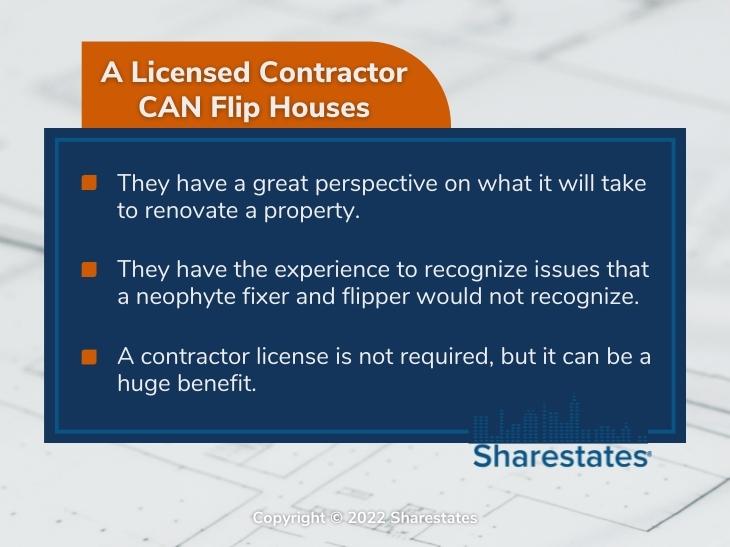There are no rules prohibiting real estate agents from buying and flipping houses. The caveat is that should a homeowner list their home with a real estate agent who then buys the home for a flipping project, it could represent a conflict of interest. That’s why many states require disclosures for realtors when purchasing or selling a house for their personal projects.
This article examines the benefits and disadvantages of obtaining a real estate license as part of a fix and flip business plan. It also provides insight into financing fix and flip projects with additional information on building your business plan.
The Benefits of a Real Estate Agent Flipping Houses
There are benefits of being a real estate agent when flipping houses. That includes commission savings both when buying and selling the property. A real estate agent also has access to the Multiple Listing Service(MLS), which can help significantly when searching for suitable flipping properties. It can also be used to list for sale renovated properties.
One further benefit is the training you’ll receive when studying for a real estate agent license. There is much to learn about real estate sales, regulations, disclosures, and more. Attending training to gain this information can be far more helpful than learning by trial and error when flipping your first few houses.
Yet, another benefit is the potential to work as a real estate agent to generate income between your house flipping project completion and sales. It can be a great way to provide income while ramping up your fix and flip business.
The Disadvantages of Becoming a Real Estate Agent for Flipping Houses
On the flip side of that coin, it takes time and money to become a licensed real estate agent. Depending on your state’s requirements, it can take a few months of training to prepare for and pass a licensing exam. Then after the cost of the training and licensing, there are ongoing expenses, including error and omission insurance premiums, software subscription fees, and ongoing continuing education required for license renewal.
Another hurdle is finding a managing broker who will sponsor your license. If your primary focus is on flipping houses, that may not be enough sales volume to motivate a managing broker to add you to their brokerage.
Can a Licensed Contractor Flip Houses?
Yes, a licensed contractor can flip houses. Plus, they have a great perspective on what it will take to renovate a property, including cost, time, and effort. They also have the experience to recognize many issues that a neophyte fixer and flipper would not recognize early in their work.
Note, too, that a contractor license is not required. But it can be a huge benefit. That includes permitting for projects as well as having access to building materials. Plus, after all the training, you’ll have the knowledge and skills needed for house flipping renovations.
Financing for Fix and Flip Projects
Loans for fix and flip projects are typically financed by private sources who specialize in matching investors with real estate projects. Banks are also an option. But will not usually finance properties in poor condition. Nor will they often take on the risk of renovations.
With private loans, you can generally expect lower down payments, a more straightforward qualification process, and flexible repayment terms. But you can also expect higher interest rates and shorter terms. These loans are generally called hard money loans and include short-term bridge loans and rehab loans.
Bridge loans are short-term financing, usually from six to 12 months and often 18 or 24 months. They are used to bridge one form of financing to another over the short term. That includes securing funding for the time needed to fix and then flip a real estate investment property.
Building a Fix and Flip Business Plan
It’s essential to develop a business plan for any endeavor. Antoine de Saint-Exupéry said it best: “A goal without a plan is just a wish.” With that in mind, start with your goals and then outline how you plan to achieve those goals. That should include how you plan to locate and purchase properties, the resources you’ll use for the renovations, and the plans for selling the property.

The plan should also cover how you will finance the work over the short term and long term. If you’re planning to pursue a real estate and contractor license, ensure you include the how and when of this critical action to support your business.
If you have previous projects, their details should be included in your business plan. They demonstrate your capabilities and highlight successes. They can also point out problems that need to be addressed in future projects.
All this will not only help you plan and execute the critical actions for your business, but it will also help demonstrate that you have a serious and successful business when you’re meeting with potential investors.
To help you consider the financing options, we’ve provided a brief guide to private real estate loans. It includes details on what you need to do to secure a private loan. You can also review our article on the pros and cons of private real estate loans.
We hope this review has helped provide insight into fixing and flipping properties, whether you’re a real estate agent or not.
To find out about funding for your business through Sharestates, click here.





